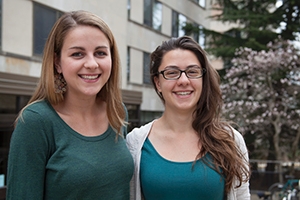Student Life
Residential Community Clusters Spark Peer Education, Leadership

Garden Group
Lindsey Halvorson’s California red pepper plant was the sole survivor of winter in her dorm garden.
“It’s a champion. I don’t know how it lived, but it’s alive and already has little flowers on it,” she said. “So, we’ll probably get peppers in the next week or two.”
Now, as spring slowly takes root, Halvorson is working to restore the lettuce, tomatoes, spinach, and beans that had once thrived just inside her windowsill. But a garden isn’t the only thing she’s growing; as a member of the residential community cluster “Go Green, Be Well,” she’s also cultivating an appreciation for healthy, sustainable living in McDowell Hall.
McDowell houses six RCCs—groups of students united around interest in particular topic areas and living together in apartment-style residences. The idea is that these student clusters will dedicate themselves to studying a topic together while also promoting it to other students on their floors.
As resident director of McDowell and neighboring Leonard Hall, Leota Wilson oversees the communities, which are only open to second-year students and range in subject from cinema to anthropology. She appreciates the framework it provides for passionate students who might otherwise find themselves in a sophomore slump.
“It’s an awesome opportunity for them to continue learning outside of the classroom in a kind of structured way,” Wilson said. “They’re a little different from other programs we have because they are entirely student-initiated.”
Cuisine Cluster
Biology major Abbey Butner and five other friends developed both the curriculum and expected learning outcomes for their community around culture, communication, and cuisine. Housing & Dining Programs financially supports the group’s monthly, hall-wide events that feature food from across the globe. This month’s spotlight on Japanese cuisine coincides with Washington, D.C.’s annual Cherry Blossom Festival.
Butner has appreciated the experience of educating and leading her hallmates through such events.
“It’s awesome. Not many universities are as proactive as AU is about giving students to have real leadership positions on campus, outside of clubs,” she said. “Leadership is much more than having a distinct role with a title. It’s about being a leader of your peers.”
Wilson can’t agree more, as she also notes the added resource of renowned faculty-in-residence Joseph Campbell, who holds office hours in McDowell. “There’s a lot of opportunity for leadership, connecting academically with a topic you’re passionate about, and meeting faculty members and others on campus,” Wilson said. “And I think it’s just fun. It provides a bit of balance to life.”
Aside from the educational and leadership offerings, Halvorson is happy to be surrounded by a supportive set of friends who can also provide her important life lessons.
“I wish we had more RCCs. It’s a really great experience to live in an apartment with six people. You learn about yourself and other people. You learn how to live with someone else,” she explained. “You learn how to cook for yourself, how to clean, and how to negotiate with your roommates.”
Long-Term Impact
To engage her hall, Halvorson—who is also the president of the student club EcoSense—has led workshops on DIY planting in recycled cans and jars. As someone who wants to spend her future career in water policy and sustainability, the program has been a perfect fit.
On the other hand, Butner discovered a career plan shift as a result of the program. Where she once wanted to focus solely on lab research, she’s realized in the program that she enjoys working with people. She’s now looking at epidemiology fieldwork for her future.
The living-learning experience has also inspired both Halvorson and Butner to lead more on campus as resident assistants next year.
“It will be fun next year to be able to apply what I learned in the RCC to different floor events and programming,” Butner said. “It’s definitely been a huge impact on my time here at AU.”
As the semester winds down, Halvorson and Butner are still working to cultivate community and learning on their respective halls through events and programming. In the meantime, Halvorson is caught up with a suddenly thriving portion of her garden—her peas.
“We have peas in the bathroom. They’re climbing up the window. I don’t know if they’re allowed to do that,” she said. “They could go higher, but I don’t have enough wood.”
